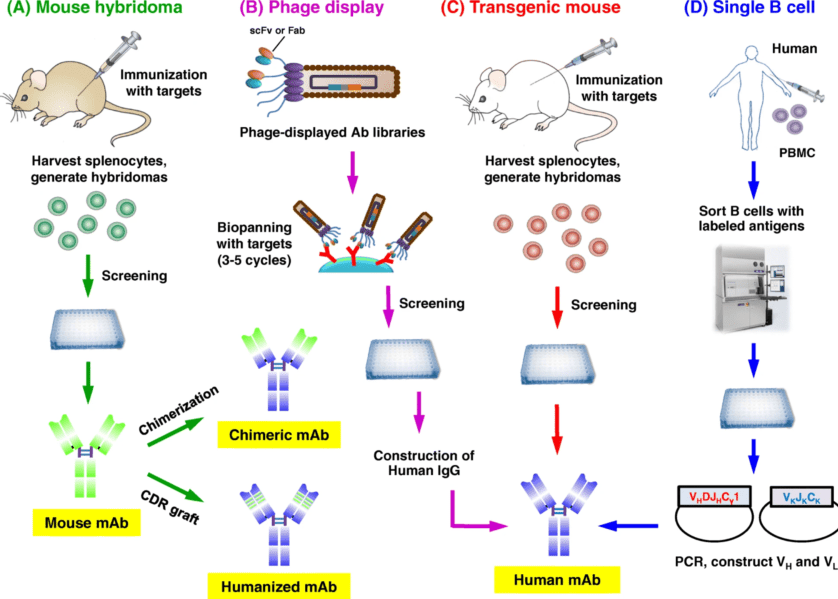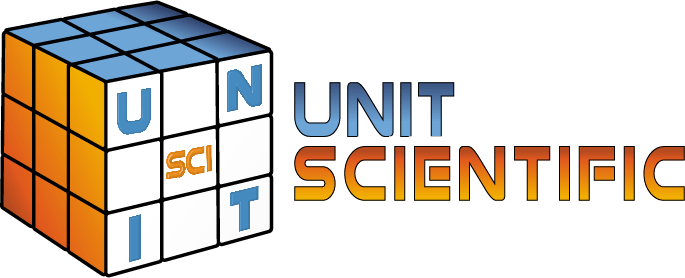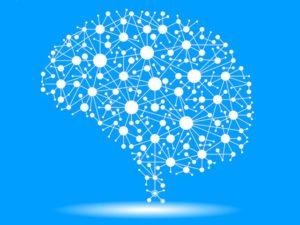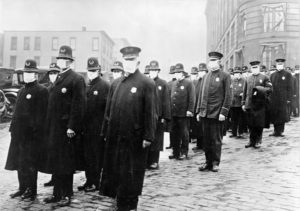
Antibodies or immunoglobulins (Ig’s) are specialized Y-shaped proteins that bind like a lock-and-key to foreign invaders entering the body through sites of injury or mucosal membranes. The foreign invaders contain substances or elements that the body does not recognize which are called antigens.
Although most of us are familiar with the concept of antibodies, confusion arises between antibody development and production. Understanding the two terms will help in pointing out the difference between these two processes and how they affect the project’s timeline and the quality of the finished good.
What Is Meant by Development of Antibodies?
Development of antibody refers to the process of generating and characterizing an antibody. The traditional antibody development process begins by injecting an antigen of interest into laboratory animals, stimulating the body’s immune system to develop its antibodies in larger quantities.
Different Methods of Developing Antibodies:
The development of the desired antibody may take several weeks as the process depends on upon several different facts, such as:
- How immunogenic the antigen is?
- Which type of host is being used?
- The type of antibody being developed.
Based on all these facts, antibodies can be developed using different methods.
- Polyclonal antibodies are purified directly from the serum of a large animal.
- For the development of monoclonal antibodies, you require spleen cells for hybridoma development or the construction of a phage display library.
- While single-chain variable region (scFv) antibodies require isolation of PBMCs.
We at Green Mountain Antibodies extend our expertise and services in developing monoclonal and polyclonal antibodies. Using our past experiences and extensive knowledge of protein chemistry and immunochemistry, we offer suggestions during the various stages of antibody development. Being one of the best antibody developers in the industry, we work hard to amplify your chances of success.
What Is Meant by Antibody Production?
When we talk about antibody production it is in the terms of generating polyclonal or monoclonal antibodies. In a broader perspective, the term refers to an entire process of creating reliable and robust antibodies at scale. The process includes immunogen production, immunization, (if you select monoclonal production) hybridoma creation, collection, screening, and purifying to be used directly in a method.
The process of antibody production typically involves the preparation of antigen conjugates alongside adjuvants and their safe injection into lab animals. This process is used to produce a high level of antigen-specific antibodies in serum, which is then recovered from the animals.
Different Methods Used for Antibody Production:
Different procedures used to produce antibodies include the following:
- Polyclonal Antibody Production: Polyclonal antibodies are directly removed from the serum of larger animals and therefore limited by the amount of serum available. Polyclonal antibodies are derived from the multitude of antibodies in the sera that recognize different epitopes of the antigen.
- Monoclonal Antibody Production: Monoclonal antibodies are produced by fusing antibody-secreting spleen cells from immunized mice with an immortal myeloma cancer cell to create monoclonal hybridoma cell lines that express one specific antibody in the cell culture supernatant which recognizes a single epitope of the antigen.
Utilizing both procedures for antibody production is extremely useful for the manufacturing of immunoassays, like an enzyme-linked immunosorbent assay (ELISA). These types of “sandwich” assays require a capture antibody to bind to the antigen in a sample and a detection antibody that binds to the antigen with a reporter that can be read on an instrument.
The capture antibody is usually monoclonal due to its specific nature for always binding to the same antigen region (epitope) of the target of interest. This leads to consistent results when the antigen is present in patient samples.
The detection antibody is most likely a polyclonal antibody due to its ability to detect several different antigen regions, therefore being able to bind to the antigen when part of it is already bound to a monoclonal antibody. Since polyclonal antibodies (a mixture of antibodies raised against an antigen) recognize several different regions there is a greater chance of overlap with off-target antigens.
If you use a monoclonal as capture then you are specifically selecting for one epitope. Then you would wash away all other antigens that are not bound. After that, you would apply the polyclonal antibody cocktail that will bind to exposed regions of the antigen allowing for the accurate reporting and detection of the antigen of interest.
Development vs. Production of Antibodies:
The development and production of antibodies may sound like the same thing, but the development of antibodies is the first step towards the production of antibodies. All antibodies are developed within the host species and then using procedures like hybridization or phage display, antibodies are produced.
Green Mountain Antibodies uses a hybridoma development process to ensure that you get monoclonal antibodies that are stable and are always available when needed. We offer the highest level of antibody production at competitive prices.
Contact Green Mountain Antibodies for a full range of services for creating new monoclonal antibodies or producing polyclonal antibodies. Call us for a free evaluation of your project: 802-865-6230.






